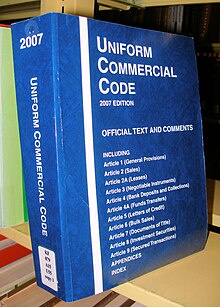Uniform Commercial Code
The Uniform Commercial Code (UCC) (German as: Uniform Commercial Code ) is a draft for the whole territory of the United States of America applicable, unified trade law .
Drafting began in the early 1940s by the American Law Institute , the National Conference of Commissioners on Uniform State Law, and some lawyers and professors. The aim of this private initiative was to create a model draft for the USA that the individual states should incorporate into their commercial law. The first draft was presented in 1950 and finally adopted by the American Law Institute in 1952. Due to some critical voices, the UCC was revised for the first time in 1958. Further revisions in which parts were revised and newly inserted took place in 1972 and ultimately in 2003.
The UCC consists of 13 articles, which are subdivided into individual subsections (“ Parts ”). The adoption by the federal states could only take place voluntarily, as the federal government does not have legislative competence . Since the UCC was not adopted by the American federal legislator, the UCC consequently not Federal Law ( federal law ). The states were therefore also free to make modifications or not to adopt parts at all.
Almost all states have now adopted this draft largely unchanged. Only Louisiana has not put larger parts into force, as it is the only federal state not based on the English, but on the French legal tradition. So each individual state still has its own trade law. However, since this is based on the UCC, the differences are mostly only minor. As a result, the UCC has at least led to a significant simplification of US commercial law. The American Law Institute constantly monitors new developments in commercial law and suggests changes if necessary.
Despite UCC, common law must still be observed, as some parts of the UCC deliberately have legal loopholes that have to be interpreted using common law. Judgments are only binding in the respective federal state, but can be used to reach a judgment in other states.
